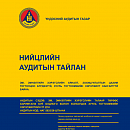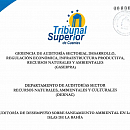.png)
SAI Gambia conducted a follow-up on the status of implementation of findings and recommendations to improve cargo handling efficiency by the Gambia Ports Authority (GPA) issued following the 2021 audit. GPA fixed a retirement age for dockworkers, outsourced the management of dockworkers, concluded a public-private partnership agreement for the Ports Expansion Project, and signed the Performance Contract with the Ministry of Finance and Economic Affairs to enhance the Ministry's supervision and monitoring of GPA. However, the Port of Banjul is still congested as stacking methods for containers are not up to standard. Despite plans to optimize cargo handling and economic and social impact assessments, the causes to the high turnaround time requiring such actions as the construction of additional berths and procurement of cranes remain unresolved.
Published
20 February 2026
.png)
SAI Malawi conducted a performance audit of the Ministry of Lands' Decent and Affordable Housing Subsidy Programme (DAHSP)* with regard to awareness of beneficiaries, procurement of building materials, timely project completion and loan recoveries. The audit was motivated by media reports regarding high default rates by the beneficiaries. The audit covered financial years from 2015–2016 to 2018–2019. Auditors noted: - inadequate sensitization; - failure to meet DAHSP's targets due to inadequate funding, poor inspections of building materials before acceptance, violations of storage conditions and delivery delays, as well as unjustified overpricing for subsidized building materials; - ineffective management of loan funds: the absence of a credit fund, inadequate document management process, delayed loan computations; - lack of District Housing Officers; - weak oversight. ________________________________ * The DAHSP, established in 2014, has two components: provision of subsidized building materials to low-income households on loan (beneficiaries repay half the value of materials plus 10% interest), and through grants for the most vulnerable people.
Published
20 February 2026

SAI Mongolia conducted an audit of the public policy on medicines and medical devices. The auditors found that there is no electronic system for the medicines and medical devices control. Moreover, in auditors' opinion, the quality, safety, and accessibility of medicines and medical devices leave much to be desired. SAI also identified violations concerning the unauthorized distribution and advertising of unregistered medicines. The auditors recommended implementing an electronic management system for medicines and medical devices as well as taking control measures including the development of standards to improve the quality and safety of medicines and medical devices.
Published
20 February 2026

SAI Bosnia and Herzegovina assessed the energy efficiency of ministries and agencies' buildings. The auditors found that public institutions lacked updated records of facilities that included information on area, energy performance, and regular monitoring of energy and water consumption, as well as greenhouse gas emissions. Additionally, there was no comprehensive plan for improving energy efficiency with established cost-effective measures. The SAI also noted that the country lacked a mechanism for the Council of Ministers to regularly report on energy consumption, implemented measures, and achieved savings. SAI's recommendations addressed to the Ministry of Foreign Trade and Economic Relations (Ministarstvo vanjske trgovine i ekonomskih odnosa) and the Service for General Affairs of Institutions (Služba za zajedničke poslove institucija) should contribute to improving energy efficiency at the country's institutions, more efficient and cost-effective use of budget funds, and reducing greenhouse gas emissions.
Published
20 February 2026

SAI Honduras conducted an audit of the Secretariat of Natural Resources and Environment (Secretaría de Recursos Naturales y Ambiente) regarding the measures for the environmental protection of the Bahia Islands (Islas de la Bahía)*, focusing on solid waste and wastewater treatment during the period from January 2, 2021 to December 31, 2024. According to the auditors, in Honduras, priority actions concerning solid waste management and wastewater treatment have not been determined at the national planning level. The audit revealed that the Bahia Islands lack the infrastructure for solid waste disposal. Only the municipality of Roatán has sewerage networks; in the three municipalities (Guanaja, Santos Guardiola and Utila) there is no wastewater treatment. The auditors recommended taht the Secretariat of Natural Resources and Environment develop and implement an environmental monitoring system to assess compliance with environmental protection measures. *One of the 18 departments of Honduras.
Published
20 February 2026
Sort setting:
Filters
Additional filters
